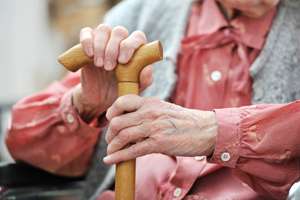Elderly who have had serious falls may show symptoms of post-traumatic stress

Older adults who experience a serious fall may develop symptoms of post-traumatic stress disorder (PTSD) in the days following the event. A study published in the journal General Hospital Psychiatry found symptoms associated with PTSD in 27 out of 100 people over 65 who had been admitted to a hospital after a fall.
"Anyone who goes through an accident in which they feel their life may be in danger or they could get physically harmed can develop post-traumatic stress symptoms," noted lead author Nimali Jayasinghe, Ph.D., assistant professor of psychology and faculty member in the Department of Psychiatry at Weill Cornell Medical College in New York.
Patients were recruited for the study while they were still in the hospital and assessed using the Post-Traumatic Stress Symptom Scale, which measures 17 symptoms of PTSD. The researchers collected information about their background, marital status, previous mental health issues and current health conditions, and about their fall, including where they fell, how long it took to get help, and the location and severity of injuries. The majority of patients had fallen in their home and had received help within an hour. The most common injury was a fracture.
Women, people who were unemployed or who had less education were more likely to report post-traumatic stress symptoms, as were those with injuries to the back or chest. PTSD symptoms were also associated with the number of other medical problems reported. The most common post-traumatic stress symptoms were feeling emotionally upset when reminded of the fall, a change in future hopes or plans, and problems falling or staying asleep.
The finding that an injury to the back or chest—but not other types of injuries—was more likely to be associated with stress symptoms was not anticipated, Jayasinghe said. Because patients were interviewed while they were still recuperating, the stress symptoms they experienced are expected to lessen over time, Jayasinghe said. "I also hope that the report will encourage studies that explore whether symptoms in the hospital setting affect outcomes there, and to what extent there are long-term effects for patients. It remains to be seen if this association will hold when more study is conducted", she added.
This is a new area for exploration in terms of studying what types of trauma can lead to post-traumatic stress symptoms, said Mary C. Curran, Ph.D., ABPP, a clinical psychologist in Yankton, South Dakota. However, there may be other causes for the stress and anxiety experienced by the patients, she said. "Being in the hospital itself causes some anxiety and stress," she noted.
More information: Jayasinghe N, Sparks MA, Kato K: "Posttraumatic stress symptoms in older adults hospitalized for fall injury." 2014. Gen Hosp Psych.


















